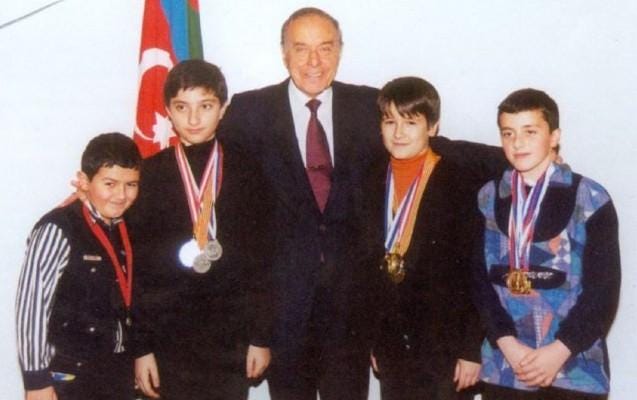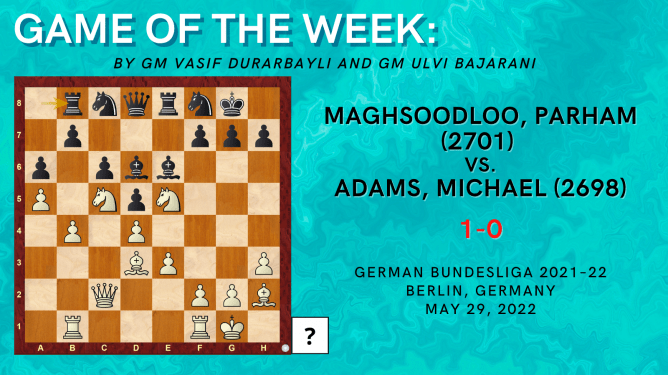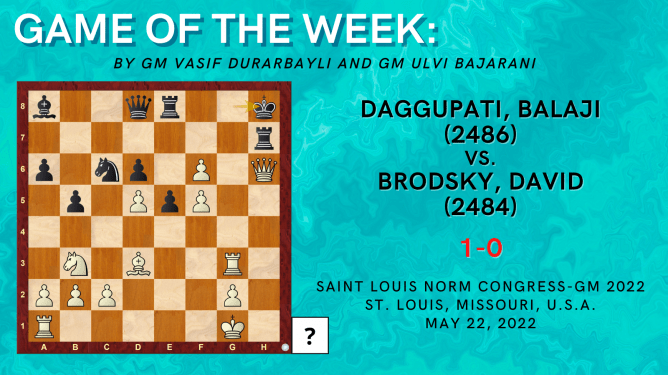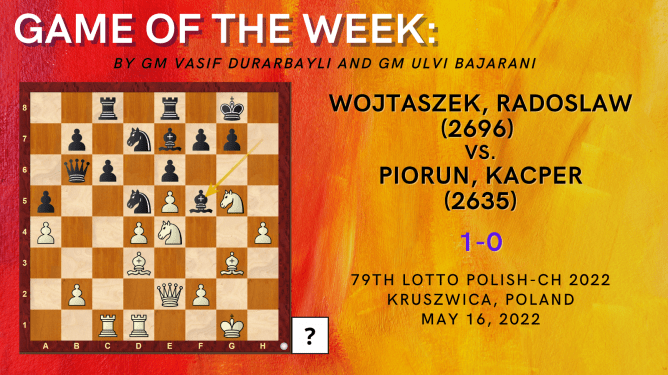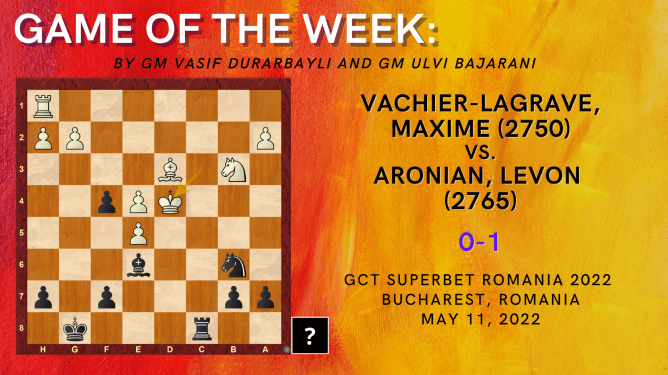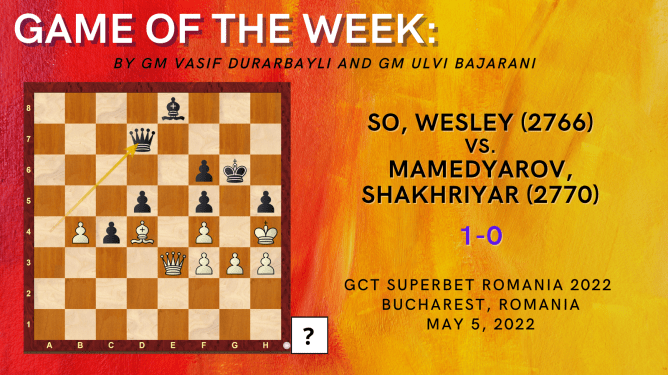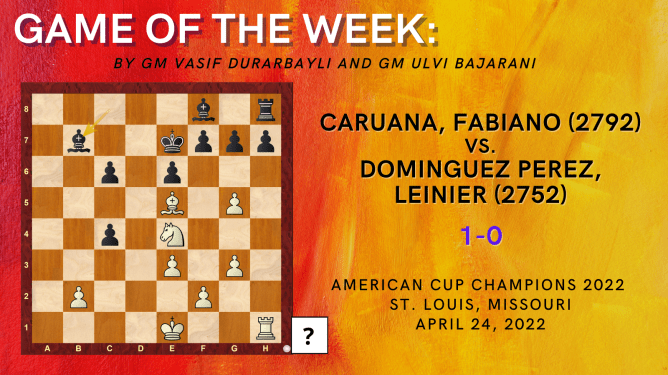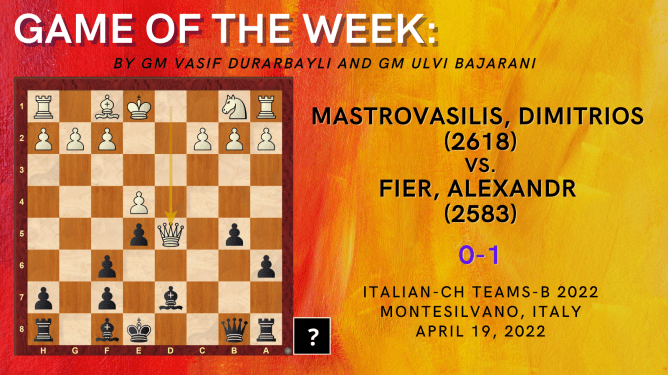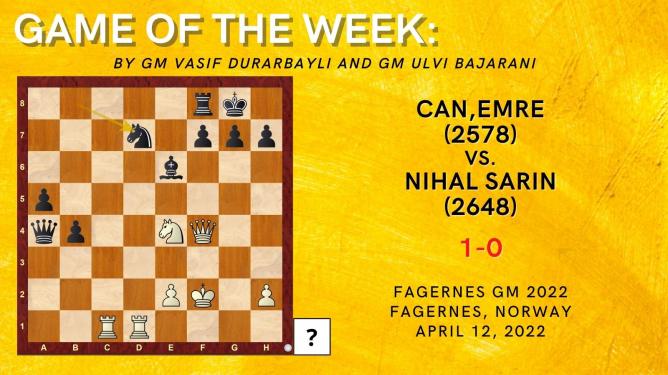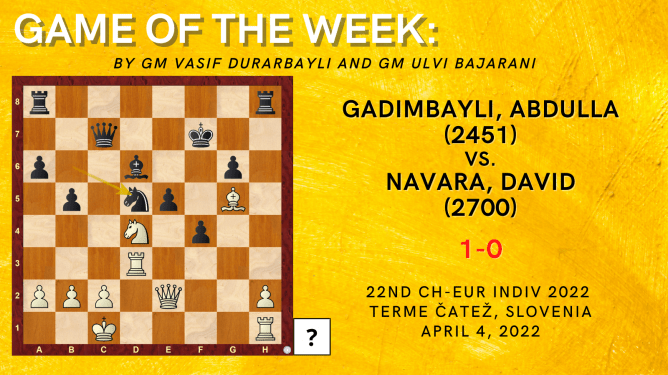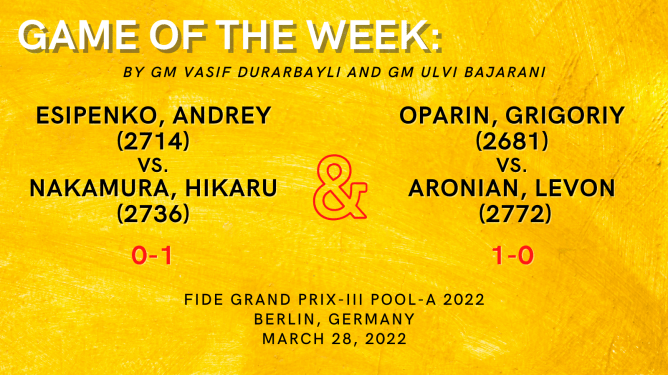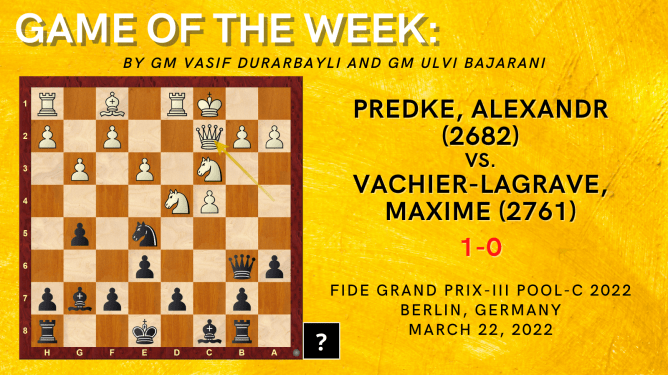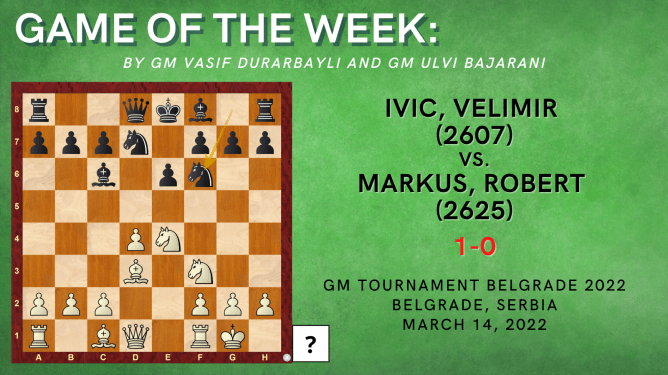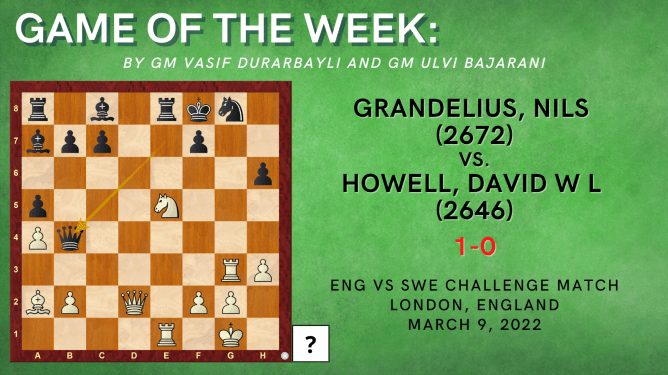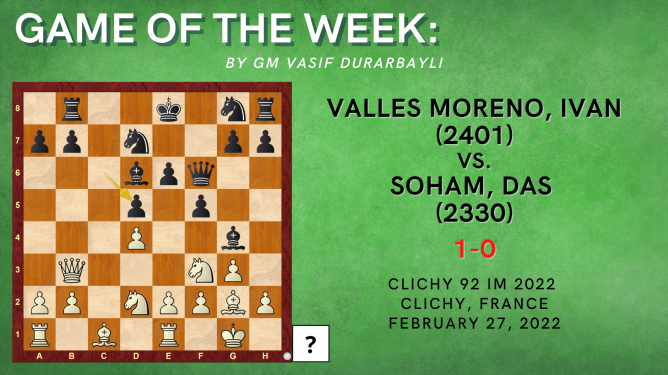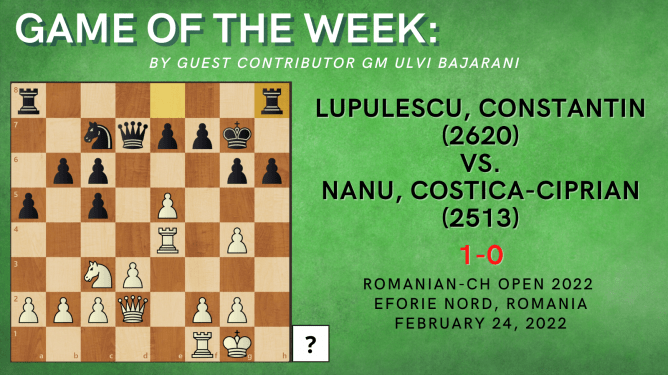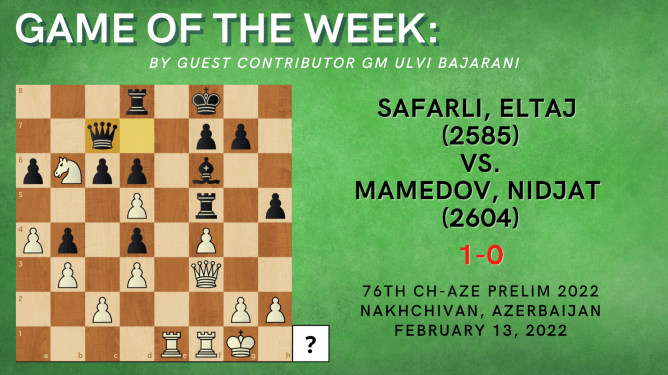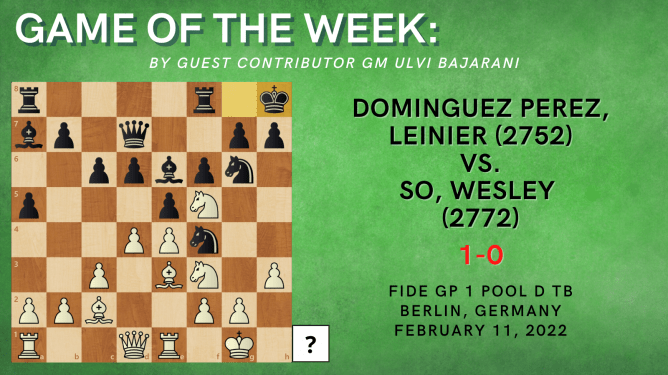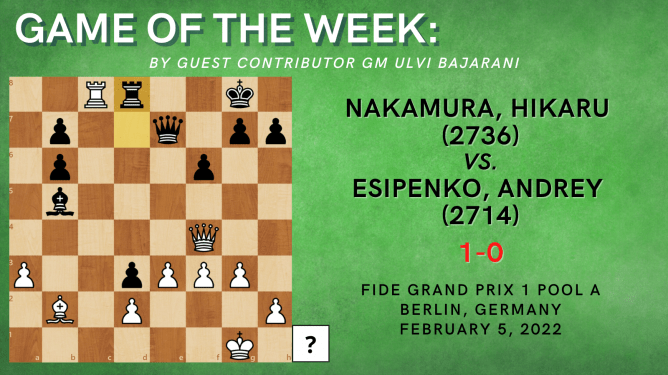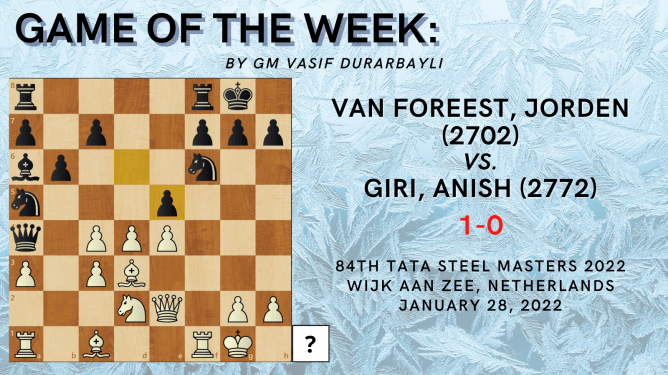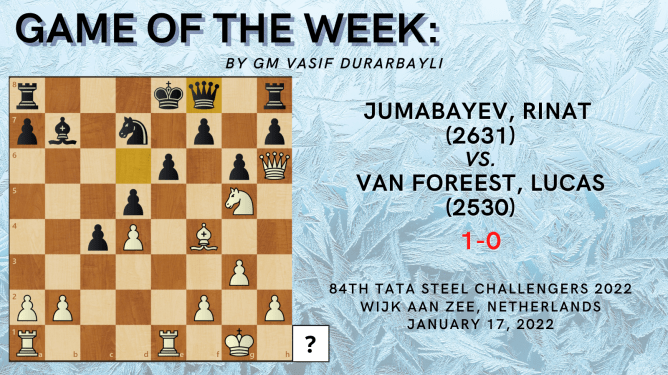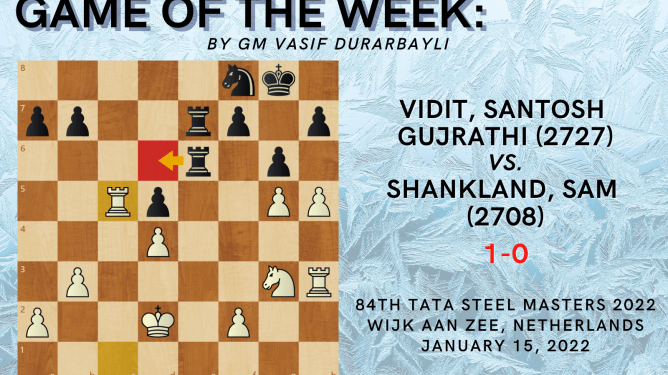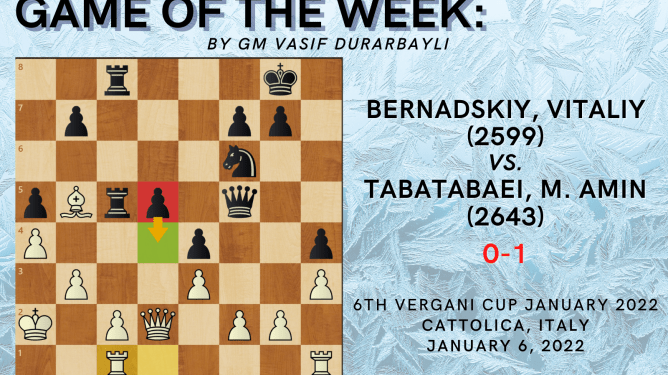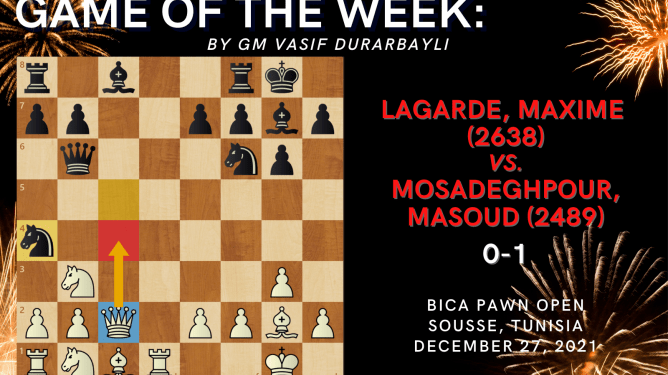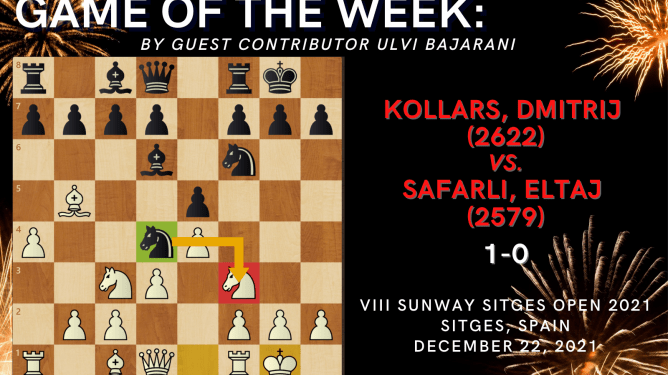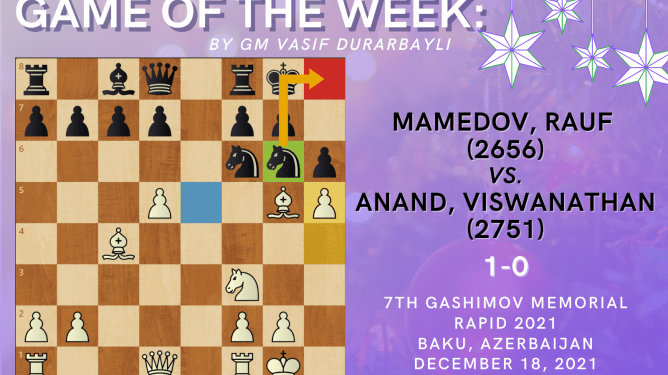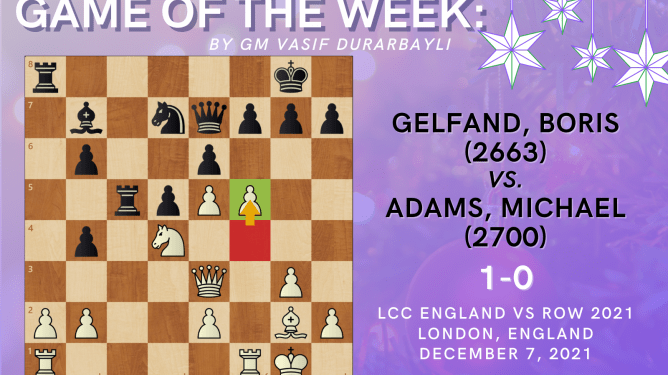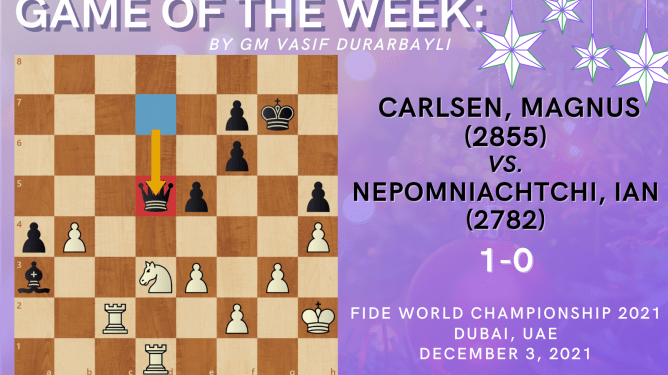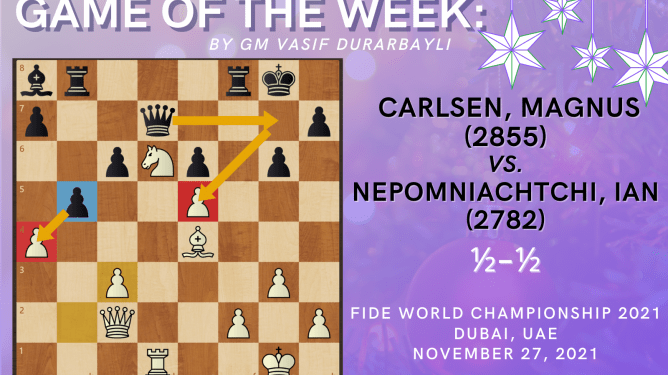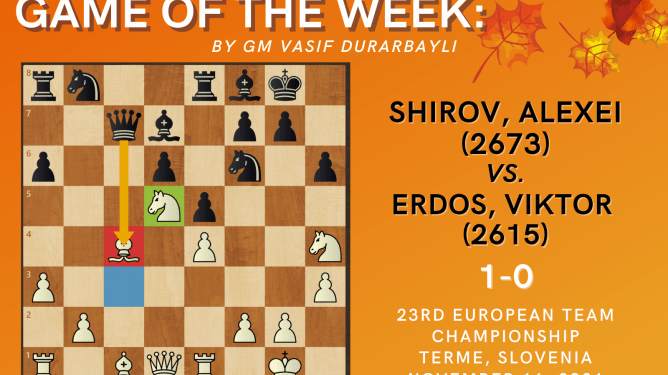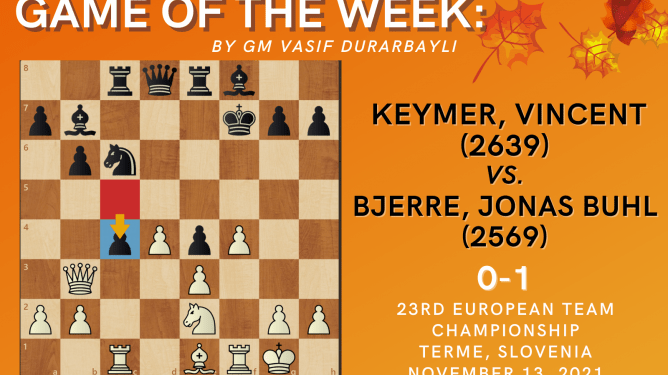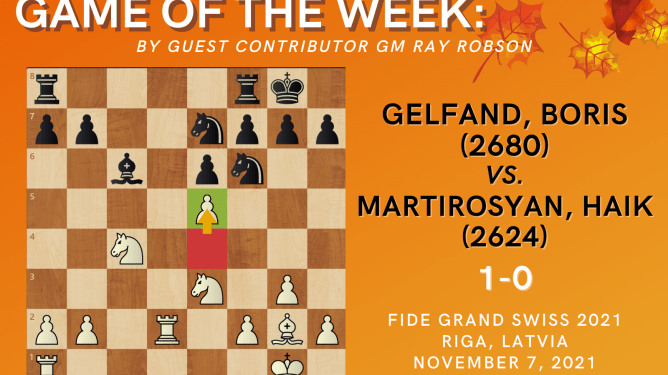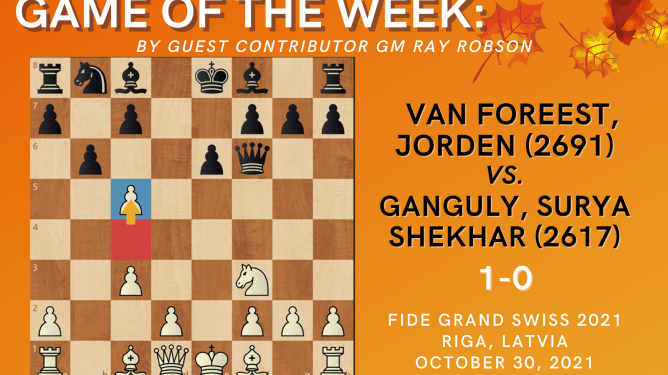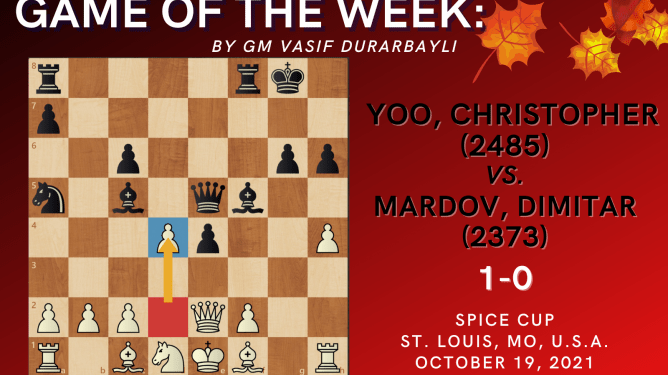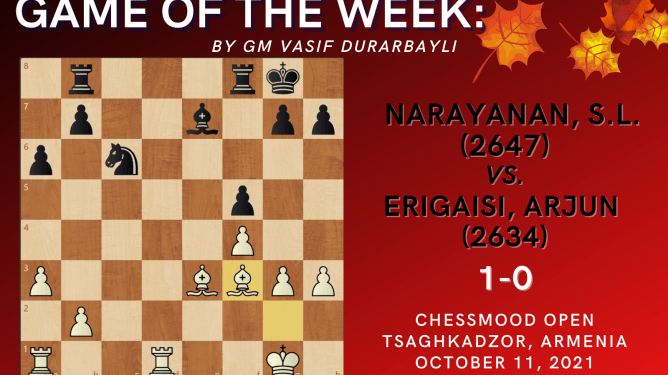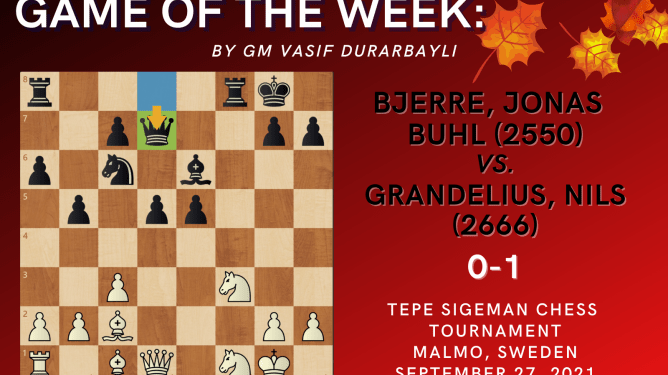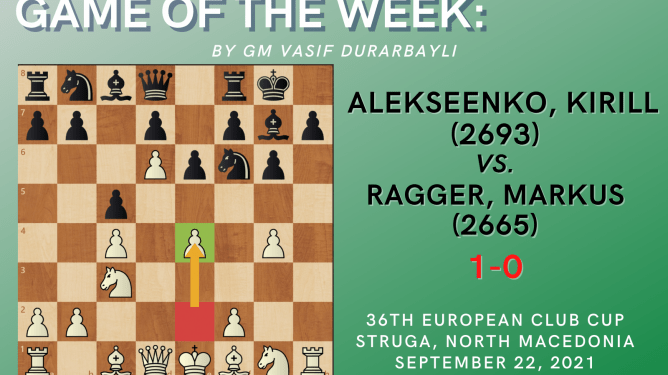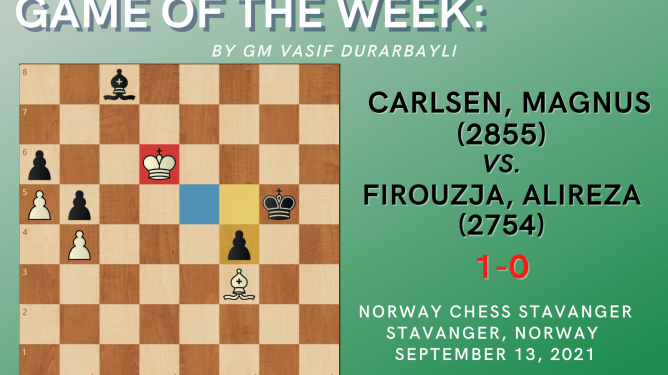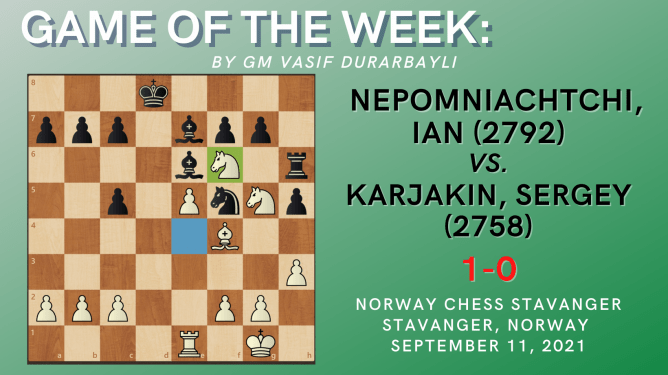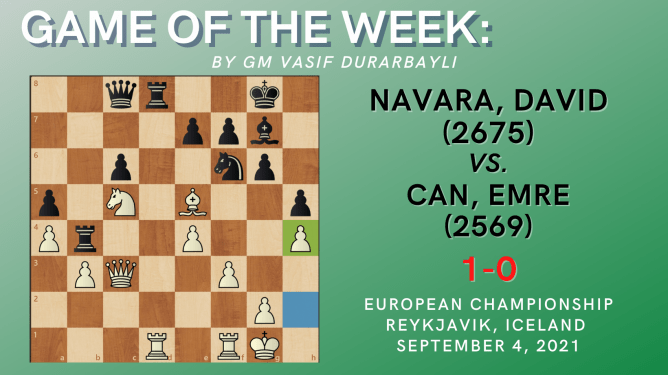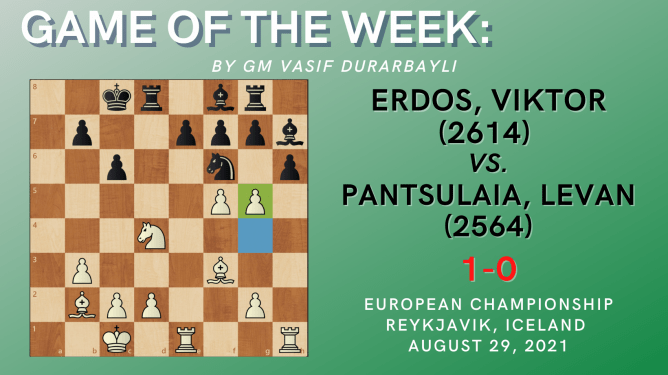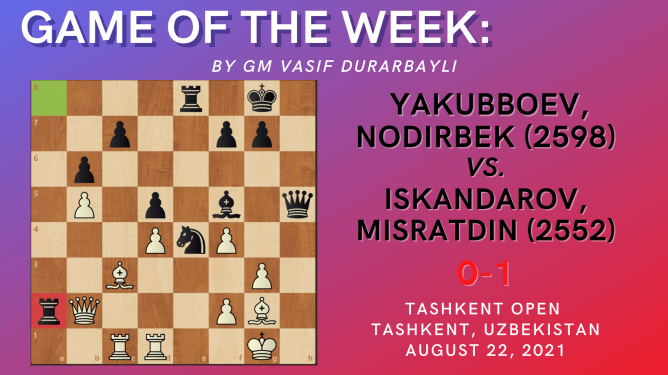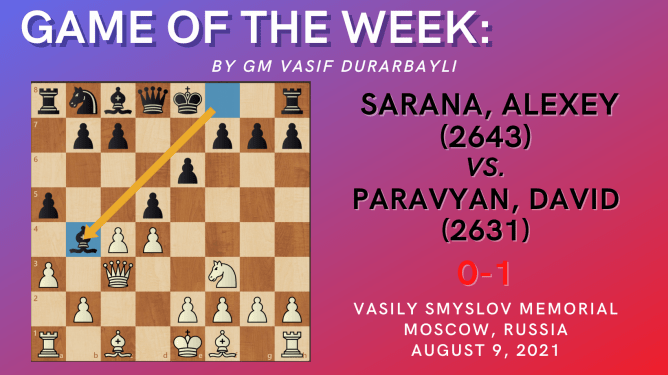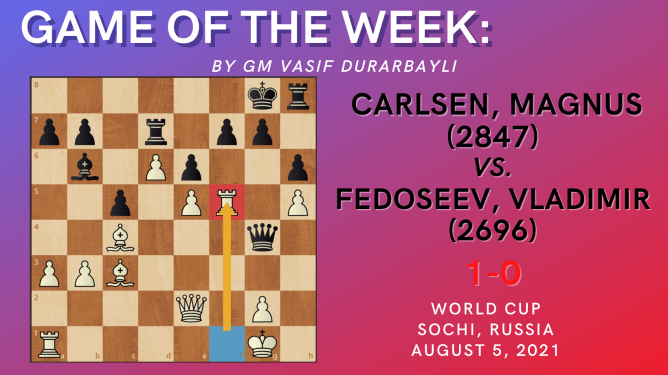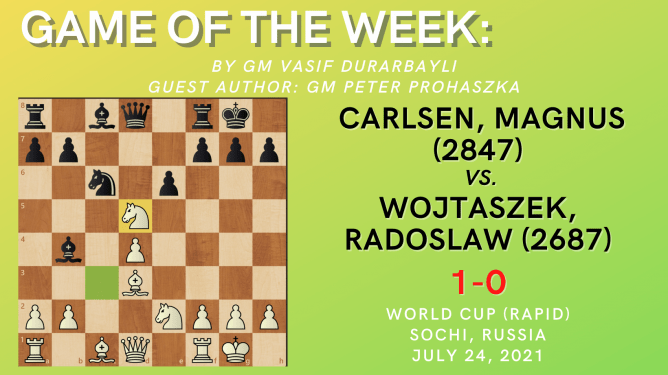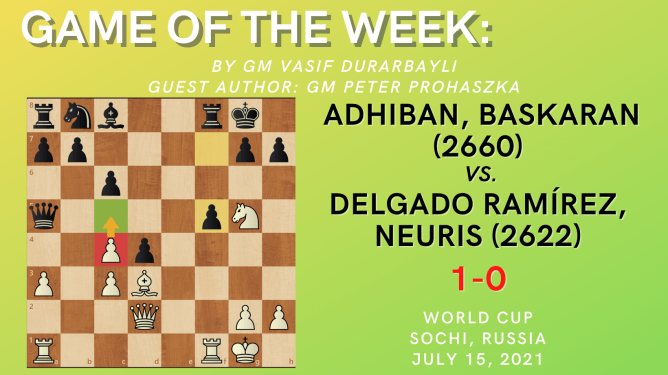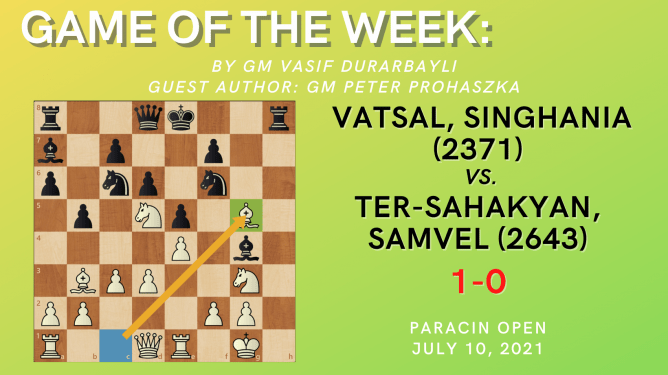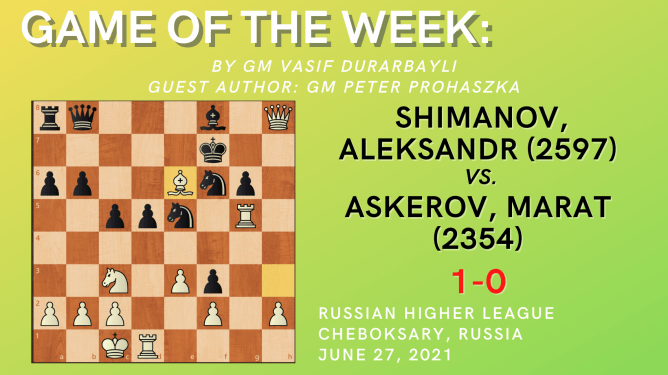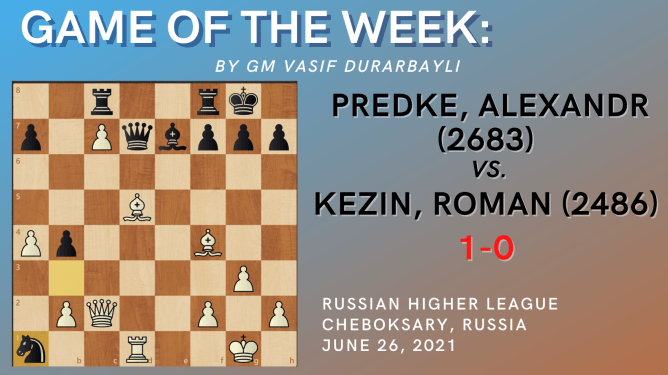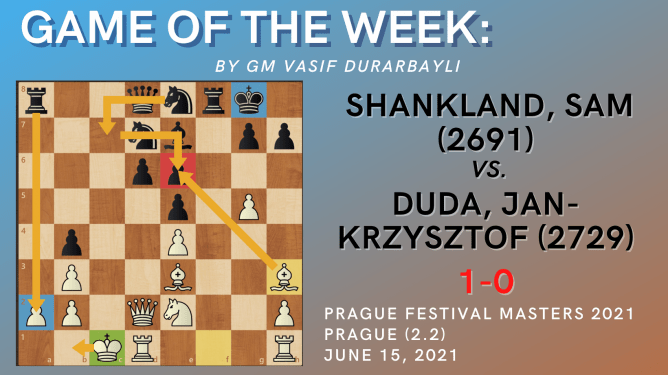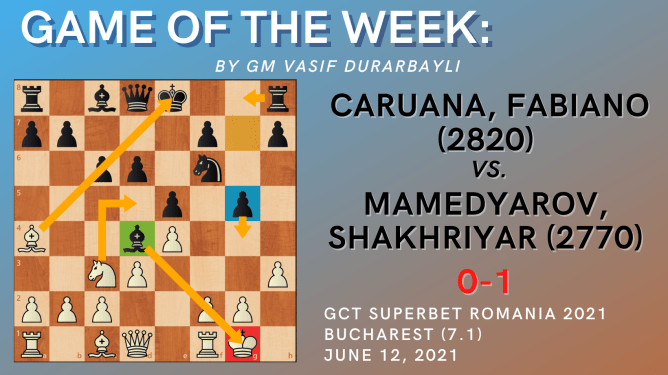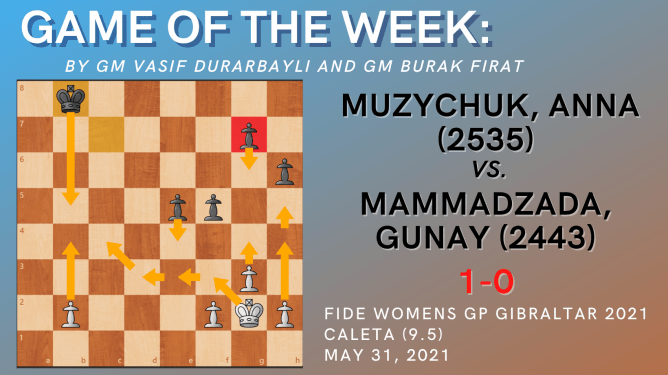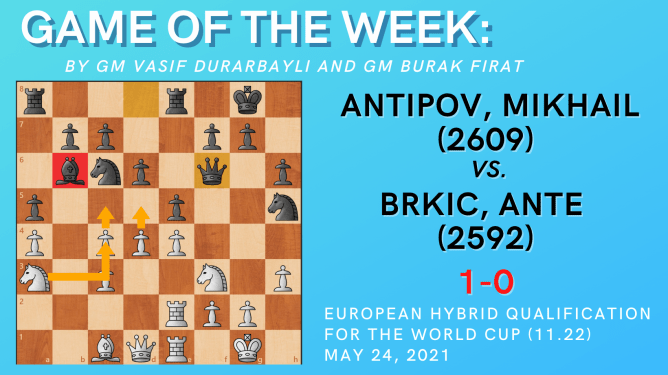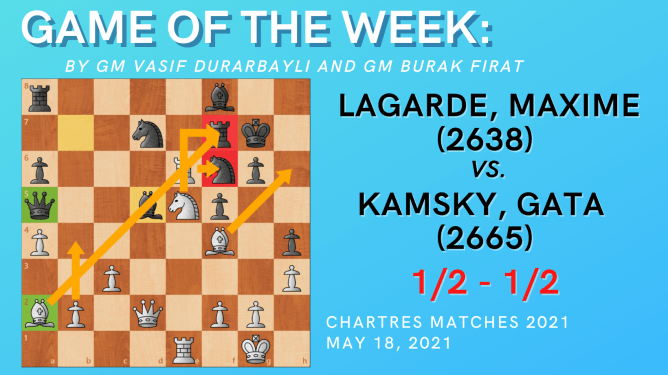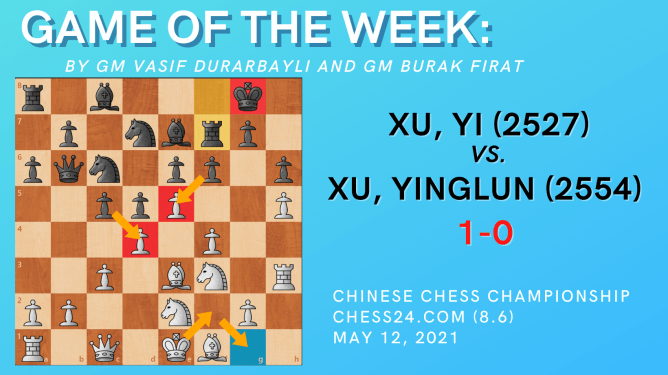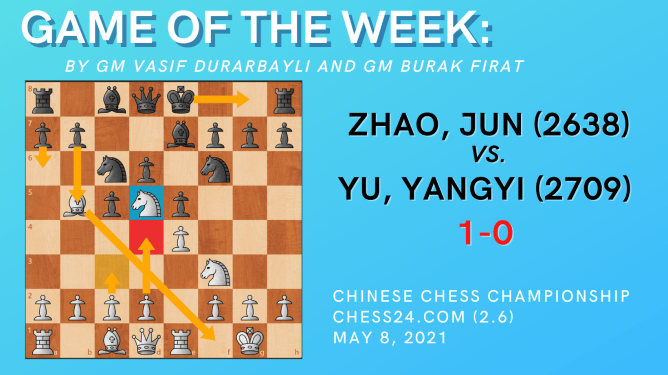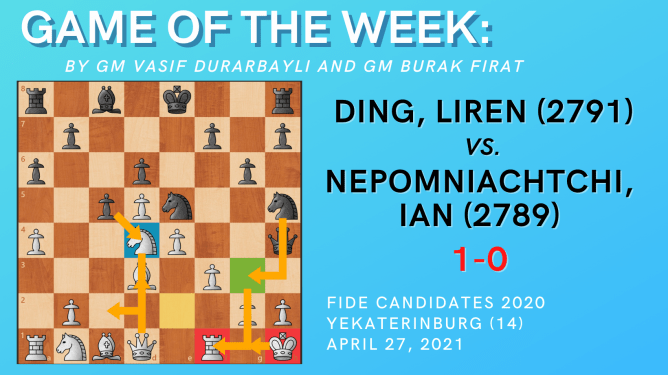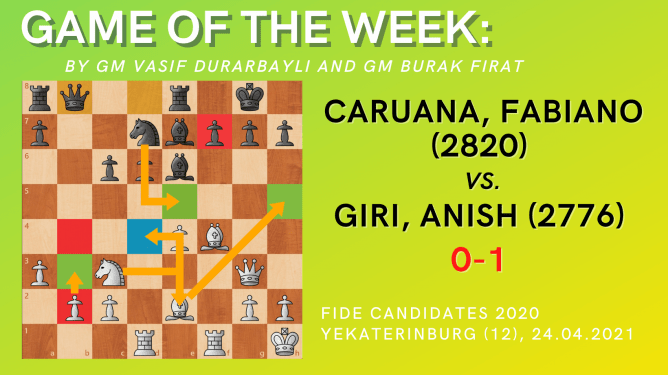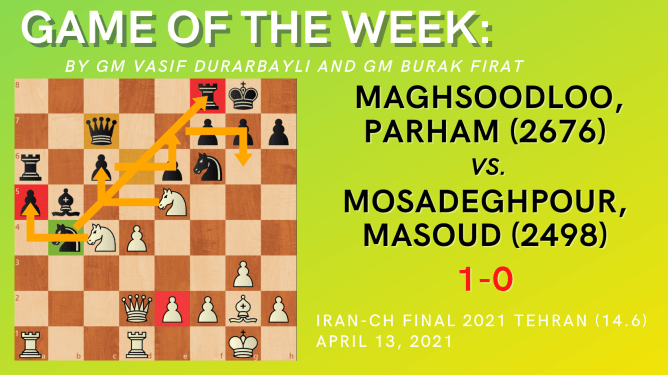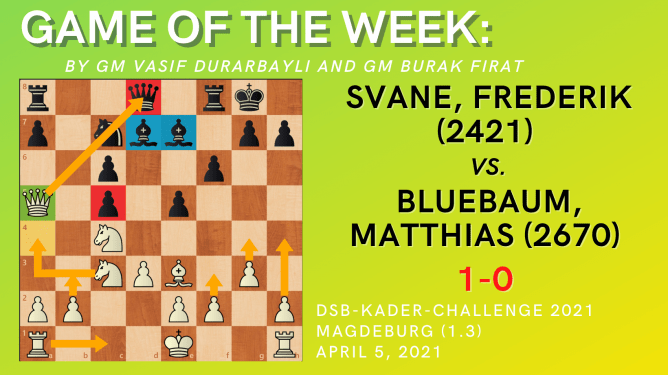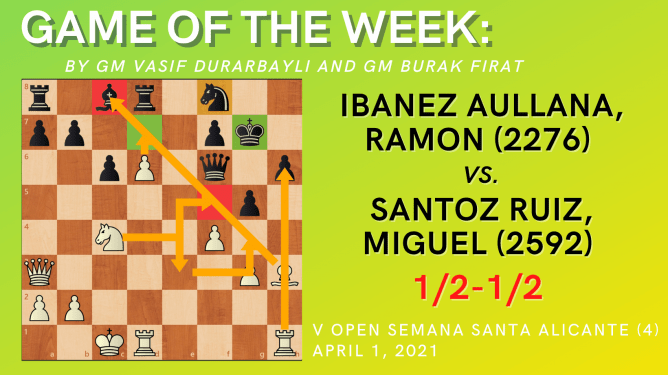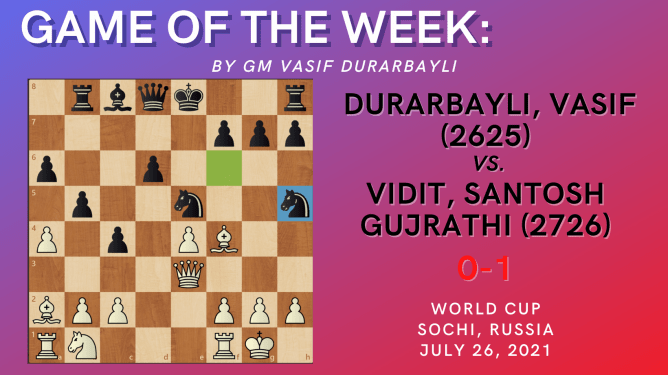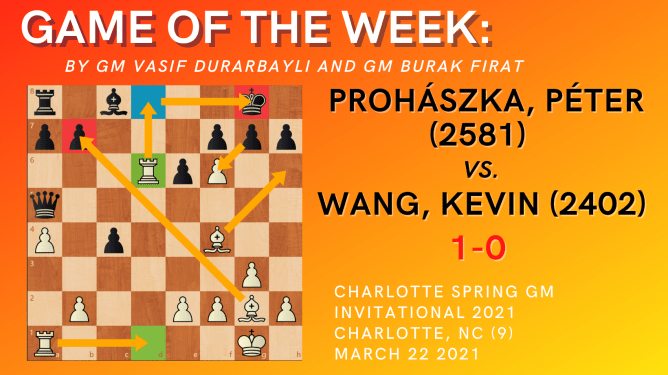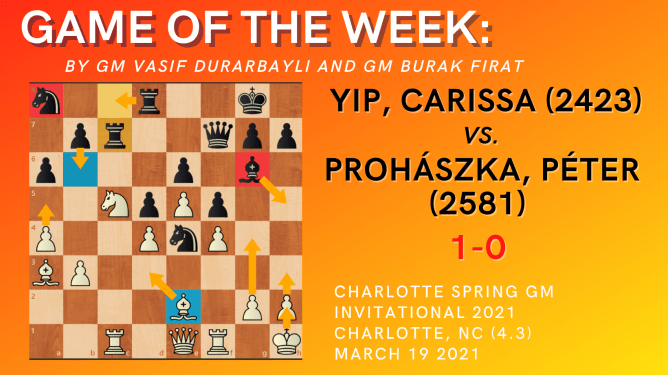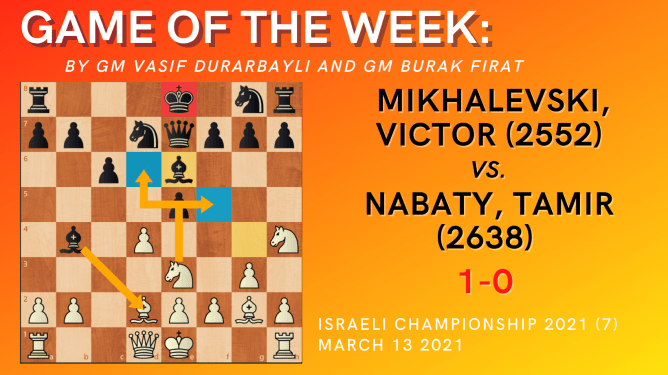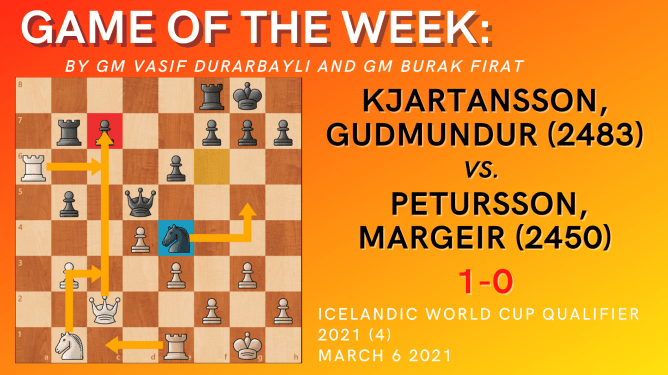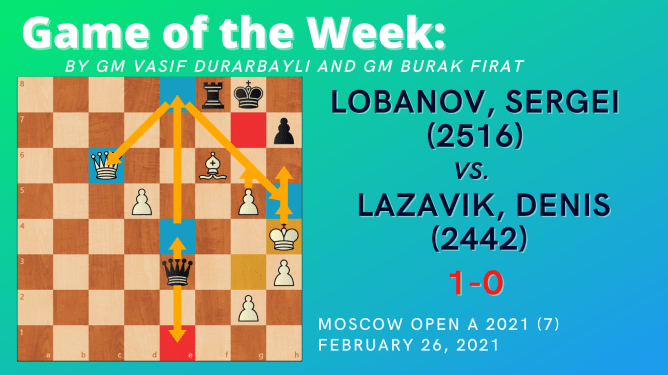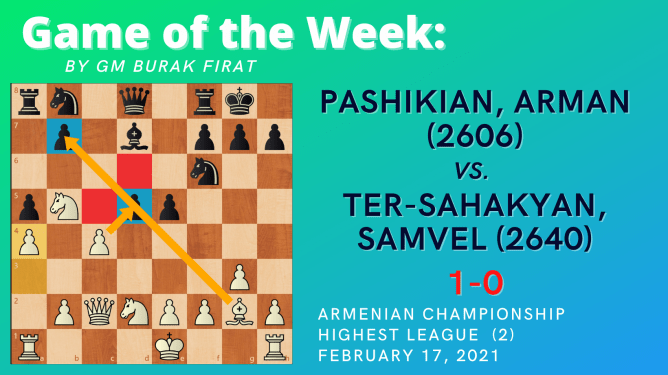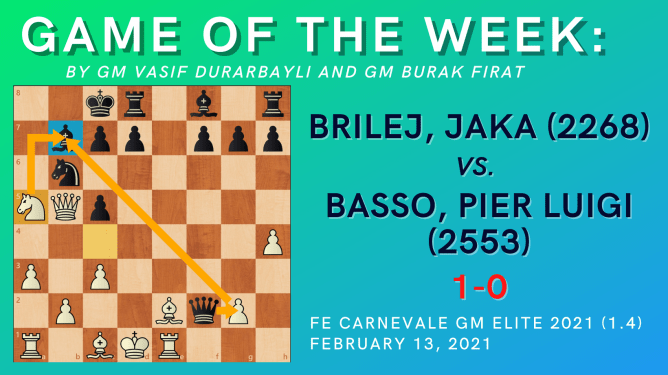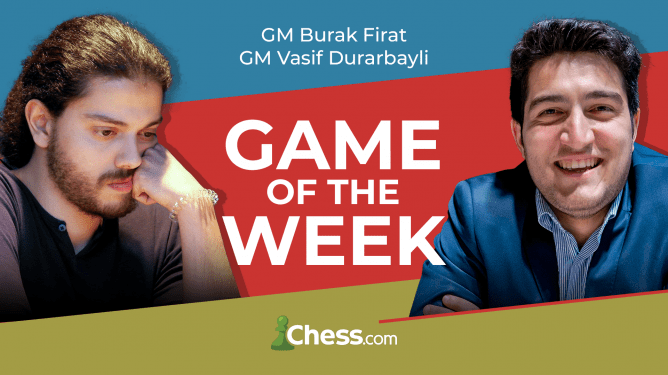-
The Game that Ended My World Cup: A Chess Analysis
This year’s World Cup ended for me with a heartbreaking game. After a great opening preparation, I secured a very promising position which I was not only unable to convert, but I also failed to draw. Eventually, this forced me to play for the win with Black, but I didn’t get any opportunity. I want…
-
Heydar Aliyev’s Centennial: A Tribute to the Legacy and Impact on Azerbaijani Chess
Today marks the 100th anniversary of the long-time leader of Azerbaijan, Heydar Aliyev. H. Aliyev’s contributions to Azerbaijan are immense, both during the independence period and the Soviet era. Surprisingly, Heydar Aliyev has also made significant contributions to Azerbaijani chess. I would like to highlight three events that stand out to me: During the period…
-
The Gray Area of Chess: Unintentional Distractions by Opponent
Chess is often considered a stressful game, and many players can attest to this fact. However, the scope of the stress involved, especially at a high-level game, is often not grasped by the public. The level of stress is directly correlated to the mastery of the player. As a player climbs the stairs of the…
-
Am I a “Chess Tourist”?
I am currently ranked the 177th chess player in the world with a rating of 2612, and two days ago participated in a very strong IX Chessable Sunway Chess Festival. I started out as the 20th seat, ended up with 5th place, and improved my world ranking. Overall, you could call it a successful tournament…
-
Game of the Week XXII: Maghsoodloo, Parham (2701) – Adams, Michael (2698)
“Why is the position getting worse with every move even though the opponent isn’t doing anything extraordinary?” Obviously, every position is unique; however, the most likely answer to this question, in general, is that your position is statically worse. Subsequently, a slow game plays into the hand of your opponent. The terms “static” and “dynamic”…
-
Game of the Week XX: Wojtaszek, Radoslaw (2696) – Piorun, Kacper (2635)
Why is the role of the center so important in chess? The main reason is that having control of the center allows the side controlling it to conduct its plan with ease. For example, a player’s attack on the opposing side’s king is more likely to be executed successfully when the center is solid, according…
-
Game of the Week XIX: Vachier-Lagrave, Maxime (2750) – Aronian, Levon (2765)
“Centralization of the king in the endgame is hardly ever incorrect. It can only be inopportune.” – from Endgame Strategy by Shereshevsky Mating the king is the primary purpose of chess; therefore, each side usually tries to keep the king safe during the middle game where their opponent has various opportunities to attack him. However, after trading the…
-
Game of the Week XVIII: So, Wesley (2766) – Mamedyarov, Shakhriyar (2770)
A ruined pawn structure around the king is a recipe for getting mated in the middle game. However, closer to the endgame, the chance of the weaker side being able to defend the king increases, which is why they usually offer trades to make the position more defensible. Nonetheless, sometimes the attacking side may also…
-
Game of the Week XVII: Caruana, Fabiano (2792) – Dominguez Perez, Leinier (2752)
During Chess.com’s coverage of the FIDE World Championship, Caruana said that he likes to go against the engine’s will in his opening preparation. Today, it is almost impossible to find any significant advantage in serious openings. Instead, the main goal of top GMs is to take their opponent out of their preparation. Caruana claims that…
-
Game of the Week XVI: Mastrovasilis, Dimitrios (2618) – Fier, Alexandr (2583)
How do blunders happen in strong players’ games? Usually, strong players blunder when they encounter a surprise in some part of the game (for example, opening moves that they have not analyzed, moves that change the evaluation, etc.) that leads to uncomfortable positions for them. They spend a considerable amount of energy trying to calculate…
-
Game of the Week XV: Can, Emre (2578) – Nihal Sarin (2648)
When there is no light piece in front of the king, such as a knight on the 3rd or 6th rank, I call it a “lone king concern”. As you would guess, in these situations, the king becomes vulnerable, especially when enemy pieces are nearby. This is why many strong players often keep the knight…
-
Game of the Week XIV: Gadimbayli, Abdulla (2451) – Navara, David (2700)
What happens when a player is “on fire”? This phenomenon is observed in chess tournaments from time to time when a player exhibits much higher performance than his rating would predict. In such cases, it seems that all of the elements – good form, luck, and the opponents’ underestimation – come together to create something…
-
Game of the Week XIII
The following question frequently arises in practice: How can I create winning chances if I’m playing with Black? The question above is very difficult to answer because there are several possible variations depending on the opponent, and a solution that would work in one situation might not work in another. There are three possible solutions…
-
Game of the Week XII: Predke, Alexandr (2682) – Vachier-Lagrave, Maxime (2761)
All chess players encounter situations where it is necessary to effectively respond to their opponents’ moves and ideas. Preventing them or preparing against them is known as prophylaxis (from Ancient Greek: πρό (pró = before) + φύλαξις (phúlaxis = a watching, guarding). There are two types of prophylaxis in chess, which might be translated into…
-
Game of the Week XI: Ivic, Velimir (2607) – Markus, Robert (2625)
There are several types of advantages in chess. After the material advantage, the easiest one to recognize is probably the space advantage, where a player controls considerably more squares than their opponent. It is common knowledge that the side with a space advantage should avoid trading pieces because the side with a space disadvantage has…
-
Game of the Week X: Grandelius, Nils (2672) – Howell, David W L (2646)
A wise man once said that a player in a lost position is like a drowning man who will try all possible ways to escape from his dire circumstances. However, just trying to save themselves may not help the player because an experienced opponent closes all possible escape routes. Consequently, a player in a losing…
-
Game of the Week IX: Valles Moreno, I (2401) – Soham, Das (2330)
“Those who do not remember the past are condemned to repeat it.” – George Santayana This quote reminds us why we should learn from history in order to help us to avoid the mistakes made by prior generations. A common piece of advice to chess players is to study the classic chess books, especially those…
-
Game of the Week VIII: Lupulescu, Constantin (2620) – Nanu, Costica-Ciprian (2513)
This Game of the Week teaches us the following chess concepts: Also, please consider contributing to the continuation of this blog by picking up one (or all!) of the products below. Let us know what you think by leaving a review on Amazon. Thank you for your support! Game of the Week VIII: Lupulescu vs.…
-
Game of the Week VII: Safarli, Eltaj (2585) – Mamedov, Nidjat (2604)
While the strongest players had been trying to outperform each other in the FIDE Grand Prix, some of the most interesting games of this week were actually played in the “non-elite” tournaments. The following game might have been chosen as the Game of the Week, but the opening variation was dubious for Black: While the…
-
Game of the Week VI: Dominguez Perez, Leinier (2752) – So, Wesley (2772)
Game of the Week is back after a brief break! Weeks 5, 6, and 7 will be posted over the next few days. Thank you for your patience. This week was rich with complex chess games. In particular, both the 1st stage of the FIDE Grand Prix in Berlin and the Azerbaijan Championship in Nakhchivan…
-
Game of the Week V: Nakamura, Hi (2736) – Esipenko, Andrey (2714)
Game of the Week is back after a brief break! Weeks 5, 6, and 7 will be posted over the next few days. Thank you for your patience. After two years of absence from classical chess, Hikaru Nakamura managed to make a perfect comeback, implementing rich ideas in his games and keeping his realization technique…
-
Game of the Week IV: Van Foreest, Jorden (2702) – Giri, Anish (2772)
“You should first sacrifice and then calculate,” responded Tal instantly. One of my favorite stories happened in the analyzing room of the USSR championship in 1978 as described in the book Garry Kasparov on Garry Kasparov: Part I: “Ex-world champion Mikhail Tal leaned over Garik (Kasparov) and with unfeigned admiration in his voice commented on…
-
Game of the Week III: Jumabayev, Rinat (2631) – Van Foreest, Lucas (2530)
The annual Tata Steel Chess Tournament always captivates the attention of the entire chess world. Every year, we witness great competition with dozens of brilliant games! Even though the tournament consists of two groups – the Masters and the Challengers – the Masters’ games usually overshadow the Challengers’. Therefore, from time to time, some brilliancies…
-
Game of the Week II: Vidit, Santosh Gujrathi (2727) – Shankland, Sam (2708)
Suddenly, your opponent plays a line that he has never played before according to your preparation. What should you do? First, take a break for a moment before playing your mainline home prep. I would recommend spending at least 5 minutes trying to understand what is happening. There are a few likely scenarios: The good…
-
Game of the Week I: Bernadskiy, Vitaliy (2599) – Tabatabaei, M. Amin (2643)
Allegedly, Radjabov said in an interview during the 2010 World Blitz Championship that “Everyone is getting tired. You might as well start with 1.a4 and you can still beat them.” Carlsen decided to test this statement against Radjabov during their 2012 World Blitz Championship game, and it worked like a charm for him! I guess…
-
Game of the Week LII: Lagarde, Maxime (2638) – Mosadeghpour, Masoud (2489)
Man’s ego is always the biggest obstacle on his way to success. The ego leads us to be more interested in what we want rather than what the person in front of us is doing, which is detrimental to chess improvement. However, chess masters have been training to overcome the ego obstacle with a lot…
-
Game of the Week LI: Kollars, Dmitrij (2622) – Safarli, Eltaj (2579)
This week’s Game of the Week will clearly demonstrate the following principles: 3. Don’t play on the side where you are weaker unless necessary. 4. Symmetrical positions can hide a lot of possibilities and troubles for both players. The Game of the Week LI is – Kollars vs. Safarli Thank you for reading! If you…
-
Game of the Week L: Mamedov, Rauf (2656) – Anand, Viswanathan (2751)
The engine equalizes easily when it comes to sidelines, which can create false impressions of security. Because of this, such variations are not deeply studied by the majority of players who play against the line. Also, a player may think that finding “simple” moves will not be difficult in order to avoid playing those lines. …
-
Game of the Week XLIX: Gelfand, Boris (2663) – Adams, Michael (2700)
A small twist in the opening can change the flow of the game. The opening phase of the game has been a common focus of the Game of the Week series, but it is still exhilarating to find a fresh, deep idea in an opening that always makes me appreciate the research aspect of the…
-
Game of the Week XLVIII: Carlsen, Magnus (2855) – Nepomniachtchi, Ian (2782)
The brain may fail you when the tension is at the highest level. Several years ago, as a young and ambitious player, I made a bad move in an important game which led to a position where I got tortured for a long time and eventually lost after a drawish but difficult-to-defend endgame. Coping with…
-
Game of the Week XLVII Carlsen, Magnus (2855) – Nepomniachtchi, Ian (2782)
“A Knight on f5 is worth a pawn” Garry Kasparov Kasparov made this statement because often, the Black side castles short. White’s knight then becomes quite annoying for Black and can create attacking ideas all the time. What about the value of the knight on d6 or d3? If we consider that either the e…
-
Game of the Week XLVI: Shirov, Alexei (2673) – Erdos, Viktor (2615)
What should you do if you cannot figure out how to equalize against a certain opening variation? The old chess wisdom says to play the variation with the opposite color and let your opponent show the equality to you if it exists. Of course, wisdom evolves over time. Nowadays, we can run strong engines and…
-
Game of the Week XLV: Keymer, Vincent (2639) – Bjerre, Jonas Buhl (2569)
Wilheim Steinitz famously claimed that the king is a strong piece and can defend himself. The first World Champion’s firm belief in this statement could be seen in his games, though sometimes, he appeared to put a bit too much trust in that assertion. Occasionally, the king would end up in a dangerous spot right…
-
Game of the Week XLIV: Gelfand, Boris (2680) – Martirosyan, Haik (2624)
This last round game was neither important for the final standings, nor particularly spectacular. However, it was a very clean game by Gelfand and is a good example of why he was an elite player for over 2 decades. Game of the Week XLIV is-Gelfand vs. Martirosian Thank you for reading! If you enjoyed this…
-
Game of the Week XLIII: Van Foreest, Jorden (2691) – Surya Shekhar Ganguly (2617)
The talented young Dutch grandmaster with the white pieces introduced one of the most creative opening novelties I have seen in recent years. This game was played in round 4 of the ongoing FIDE Grand Swiss in Latvia, with both players on 1/3. Game of the Week is XLIII- Van Foreest, Jorden vs. Surya Shekar…
-
Game of the Week XLII: Yoo, Christopher (2485) – Mardov, Dimitar (2373)
The new generation of chess players has been fascinating me with their approach to the opening. The opening ideas that I often see in their games result in a visually ugly-looking, underdeveloped position on the surface. However, there is usually a certain tactical idea behind these positions that justifies such underdevelopment. Usually, this type of…
-
Game of the Week XLI: Narayanan.S.L (2647) – Erigaisi, Arjun (2634)
“Why should I learn an opening that I won’t play with either color?” The best way to answer this question is with an example! Let’s say you are not a 1.e4 player nor a Caro-Kann player, so you may skip looking at a game from the Panov variation of Caro-Kann. However, such oversight could come…
-
Game of the Week XL: Mastrovasilis, Athanasios (2523) – Nikolov, Momchil (2522)
“Pattern Recognition” has become a common term in chess language, and everyone wants to find an easier way to master it. The best way to accomplish this that I can suggest would be to start by reviewing/playing well-known simple tactical motives and build on that; essentially: solve puzzles non-stop. It’s like learning math: the foundation…
-
Game of the Week XXXIX: Bjerre, Jonas Buhl (2550) – Grandelius, Nils (2666)
The story goes that Robert James Fischer used to study all published chess games, including the USSR Women’s Chess Championship. The same probably goes for the current top players. Frankly speaking, I have not been very attentive and following the events closely. Nevertheless, since I am always in search of a good game for my…
-
Game of the Week XXXVIII: Alekseenko, Kirill (2693) – Ragger, Markus (2665)
Could you believe it if 8 out of 9 moves by White in the opening of a high-level game were made by pawns – and White would actually be winning?! I remember when I was just learning how to play chess that I would make many pawn moves at the beginning of the game; then…
-
Game of the Week XXXVII: Carlsen, Magnus (2855) – Firouzja, Alireza (2754)
“What openings should I play?”; “Is _____ opening good to play?” As a chess streamer and coach, I hear these questions all the time… Before anyone asks this question, though, they need to figure out what their strengths are and play on those. Also, figuring out one’s weaknesses could help one to overcome them. As…
-
Game of the Week XXXVI: Nepomniachtchi, Ian (2792) – Karjakin, Sergey (2758)
The “Berlin Wall” was used by Johannes Zukertort in the first World Championship match of 1886 without success; however, the variation got full recognition when Kramnik used it against Kasparov successfully in the 2000 World Championship match. This “wall” was first a headache for Kasparov, and now it has become a headache for all 1.e4…
-
Game of the Week XXXV: Navara, David (2675) – Can, Emre (2569)
What do you do when you have a great position in a chess game? Most people would immediately look for the final blow to their opponent to secure the win, which is the right approach, but what if there is no clear path to finishing the game? In this scenario, ask yourself what your opponent…
-
Game of the Week XXXIV: Erdos, Viktor (2614) – Pantsulaia, Levan (2564)
When two players of around the same strength meet over the chess board, each move is part of the tit-for-tat strategy. Starting from the first move, White creates a threat. For instance, 1.e4 poses the threat of taking over the center which is the most important part of the battlefield. Black plays 1…c6 and the…
-
Game of the Week XXXIII: Yakubboev, Nodirbek (2598) – Iskandarov, Misratdin (2552)
“When you have an advantage, you are obliged to attack; otherwise, you are endangered to lose the advantage.” Wilhelm Steinitz The automatic advantage when playing with White is considered to be an axiom in chess because White can start putting problems in front of Black from the very first move. However, the initiative of starting…
-
Game of the Week XXXII: Sarana, Alexey (2643) – Paravyan, David (2631)
The basic chess principle of not moving the same piece twice in the opening has already become history. The game is becoming more dynamic every day, mostly thanks to the evolution of engine strength. Every “weird-looking” move in the opening has some tactical justifications behind it, or objectively it does not equalize the position, but…
-
Game of the Week XXXI: Carlsen, Magnus (2847) – Fedoseev, Vladimir (2696)
It is always tricky to play for a win with Black against a strong player in high-level chess because most openings force draw-ish positions, especially when the first move by White is e4. In my experience, there are a few strategies to aim for a win instead of a draw with Black: In all of…
-
Game of the Week XXIX: Carlsen, Magnus (2847) – Wojtaszek, Radoslaw (2687)
By Guest Contributor Grandmaster Peter Prohaszka: This week’s choice fell upon a beautiful technical win by Magnus Carlsen to Radoslaw Wojtaszek in their second rapid game at the World Cup. It is rare that we see a bishop dominating a knight so pristinely in modern chess. It was spectacular to watch it live, and I…
-
Game of the Week XXVIII: Adhiban, Baskaran (2660) – Delgado Ramírez, Neuris (2622)
By Guest Contributor Grandmaster Peter Prohaszka: In the second round of the World Cup, the strong GM Baskaran Adhiban created a beautiful attack that I suspect was a result of a deep and thorough preparation. Let’s have a look at this gem of a game! Thank you for reading! If you enjoyed this article, please click the…
-
Game of the Week XXVII: Vatsal Singhania (2371) – Ter-Sahakyan, Samvel (2643)
By Guest Contributor Grandmaster Peter Prohaszka: My choice this week fell upon an upset that happened at the Paracin Open. The very strong Armenian GM, Ter-Sahakyan Samvel, was defeated by his young opponent in a spectacular manner. Let’s see how it happened! Thank you for reading! If you enjoyed this article, please click the “Share” button, and…
-
Game of the Week XXVI: Shimanov, Aleksandr (2597) – Askerov, Marat (2354)
By Guest Contributor Grandmaster Peter Prohaszka: In the following game, Webster alumnus and very strong Russian GM Aleksandr Shimanov demonstrates the power of the initiative. Black, after going for a dubious opening line, never really gets back in the game. He survives the vicious attack, only to find himself in a losing endgame. Let’s have a…
-
Game of the Week XXV: Predke, Alexandr (2683) – Kezin, Roman (2486)
One of the first things new players learn in chess is the relative value of the pieces. For instance, a queen = 9 points, rook = 5 points, bishop = 3 points, knight = 3 points, pawn = 1 point,, and the king’s value is infinite. Of course, there are different scales too, but this…
-
Game of the Week XXIV: Shankland, Sam (2691) – Duda, Jan-Krzysztof (2729)
Winning a game “at home” is a dream scenario for all players. Experts usually spend an immense amount of time preparing surprises against their opponents. However, most of the surprises never get used. On the other hand, when home prep occurs on the board, a player understands that their hard work was not in vain!…
-
Game of the Week XXIII: Caruana, Fabiano (2820) – Mamedyarov, Shakhriyar (2770)
Show me your favorite chess ideas, I will tell you who you are. Of course, you must be a famous chess player for me to satisfy this. It is an interesting phenomenon that every player has a unique approach to the game. If you pay close attention to the players’ games, you will recognize some…
-
Game of the Week XXII: Muzychuk, Anna (2535) – Mammadzada, Gunay (2443)
Nowadays, most players are not enthusiastic about studying endgames, especially when it comes to pawn endgames. The main arguments are: Actually, pawn endgames do not happen often because most people do not know how to navigate this type of endgame and try to avoid it at all costs. If you are not good at pawn…
-
Game of the Week XXI: Antipov, Mikhail (2609) – Brkic, Ante (2592)
Perhaps you have heard before that “If one piece is in a bad position, the whole position is bad.” The concept of using the other player’s bad piece to their advantage is well-known and quite often we see this strategy utilized by masters. For some reason, that piece is usually the bishop. A bishop could…
-
Game of the Week XX: Lagarde, Maxime (2638) – Kamsky, Gata (2665)
“Winning a won game is the hardest thing in chess” is a well-known quote by Frank Marshall. This may be why we often hear when someone angrily exits the playing hall after losing and exclaims, “I was completely winning!” I have heard of a funny recruiting technique by a coach who would approach parents and…
-
Game of the Week XVIII: Zhao, Jun (2638) – Yu, Yangyi (2709)
By Guest Contributor Grandmaster Vahap Sanal. Another great event, the Chinese Chess Championship, is happening this week. With a lineup full of unique players capable of producing exceptional games, I am sure this tournament will showcase many more interesting games like the following. Today’s Game of the Week is a prime example of how overlooking…
-
Game of the Week XVII: Ding, Liren (2791) – Nepomniachtchi, Ian (2789)
Hypermodernism in chess emerged at the end of World War I. The concept, which went against the classical approach that promoted an immediate fight to the center of the board, sparked fierce debates within the chess community at that time. The most well-known advocates of the new approach were Aron Nimzowitsch, Richard Réti, Savielly Tartakower,…
-
Game of the Week XVI: Caruana, Fabiano (2820) – Giri, Anish (2776)
The Greek philosopher Heraclitus once declared: “No man ever steps in the same river twice, for it’s not the same river and he’s not the same man.” I think he had a good point with the river part, but I am not sure about the other part, as I don’t think that humans can change…
-
Game of the Week XV: Maghsoodloo, Parham (2676) vs. Mosadeghpour, Masoud (2498)
“I will make 40 good moves and if you are able to do the same, the game will end in a draw.” Vasily Smyslov There has been a fierce debate in the past about what the result of a chess game would be if both sides played all of the best moves. Now that millions…
-
Game of the Week XIV: Svane, Frederik (2421) vs. Bluebaum, Matthias (2670)
Have you ever gotten the feeling of being totally outplayed by your opponent and wonder where you made a mistake? This usually happens when two players from different classes encounter each other and the stronger one utilizes more advanced techniques than their opponent is accustomed to. Instead of one side making an obvious blunder, the…
-
Game of the Week XIII: Ibanez Aullana, Ramon (2276) vs. Santoz Ruiz, Miguel (2592)
So-called “grandmaster draws” used to bother many chess lovers, so some organizers came up with rules against it. The most known and recognized one is a no-draw offer before move 30, which is applied in most FIDE events. This may sound like a good rule on the surface, but it led to ugly repetition draws…
-
Game of the Week XXX: Durarbayli, V (2625) – Vidit, G (2726)
The game below may not elicit any particular feeling or thought at first sight. However, that game may have ended up costing me $10,000 and a qualification for the Grand Prix series during my World Cup match against Vidit! After the match, I was contemplating how my opponent could have been so well-prepared against a…
-
Game of the Week XII: Prohászka, Péter (2581) vs. Wang, Kevin (2402)
In his book Grandmaster Opening Preparation, Jaan Ehlvest splits opening approaches into two categories: As an example, Ehlvest referred to Botvinnink a Researcher and to Tal as a Non-Researcher. It is also important to note that he mentions that it is hard to be strictly one or the other nowadays – a strong chess player should be…
-
Game of the Week XI: Yip, Carissa (2423) vs. Prohászka, Péter (2581)
While reflecting on the topic of women in chess during this Women’s History Month, I recalled being fortunate enough to be a part of the Susan Polgar Institute for Chess Excellence (SPICE) at Webster University created by Women’s World Champion Susan Polgar. During those years, we had several discussions about how different the chess world…
-
Game of the Week X: Mikhalevski, Victor (2552) vs. Nabaty, Tamir (2638)
How does a “Miniature” happen in a high-level chess game? A “Miniature” is a game that ends in less than about 20 moves. It usually happens in lower-level players’ games because one player may go against general principles such as developing their pieces, not playing with only one piece too much at the beginning of…
-
Game of the Week IX: Kjartansson, Gudmundur vs. Petursson, Margeir
Perhaps you have heard about “torturing” another player in chess and wonder: How is it possible to torture anyone in a board game?! There are several ways to “torture” one’s opponent in a match, 2 common examples of which are the following: What other examples of “torture” have you experienced in your matches? Share them…
-
Game of the Week VIII: Lobanov, Sergei vs. Lazavik, Denis
Once, a player with around a 2250 level asked me after our game, “What was the evaluation of the position?” I responded, “You had a better position with great chances of winning and I did not have any real counterplay.” He repeated the question which I answered in more or less the same way. Then,…
-
Game of the Week VII: Pashikian, Arman vs. Ter-Sahakyan, Samvel
Today, I read my friend FM Alper Efe Ataman’s Facebook post on The Life and Games of Vasily Smyslov, Vol. 1 by Andrey Terekhov. The author provided an explanation in his book as to why Smyslov is overshadowed by other world champions, even though he played the candidates’ match final at the age of 63! Essentially, Alper…
-
Game of the Week VI: Brilej, Jaka vs. Basso, Pier Luigi
I recently read the book The Road to Chess Improvement by Alex Yermolinsky. This was the kind of book that I wish I had read way earlier in my chess career and highly suggest that you read as well if you have not already done so! It was written in 1999 when Yermolinsky was still playing chess…
-
Game of the Week – Week 5
As I’m sure is the case for many of you, the lack of in-person tournaments during the pandemic has only increased my craving for watching and analyzing high-quality chess games while at home, and the Tata Steel 2021 tournament did not disappoint! In my opinion, it was one of the most memorable tournaments of all…
-
Game of the Week – Week 4
When you hear the word “assumption”, a negative connotation may come to mind. Many of us have been advised at some point in our lives to avoid making assumptions or jumping to conclusions; however, this habit is ingrained in our nature as we are constantly making assumptions to help us make sense of the complicated…
-
Game of the Week – Week 3
Every day, we are faced with hundreds of decisions that could change the course of our future. For most of us, fortunately, the majority of these decisions are not life-changing. However, consider if you were the leader of an organization in which many of the decisions you make could potentially be critical for your company.…
-
Game of the Week – Week 2
“I regard chess as being an equivalent exchange.” Mikhail Botvinnik, 6th World Chess Champion Since the beginning of the pandemic, the interest in our beloved game from people around the world has increased substantially. I was pleasantly surprised to see that more than 50,000 viewers across streaming platforms were watching the Tata Steel tournament on Saturday!…
-
Game of the Week – Week 1
Why is chess considered a sport? Even though the International Olympic Committee recognizes chess as a sport, this is still one of the most common questions that I am asked as a chess player. To me, chess is actually not only a sport, but instead is a combination of sport, science, and art: Sport because two…

